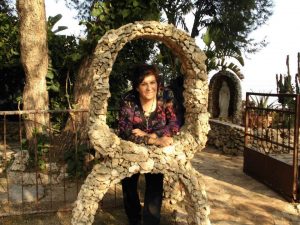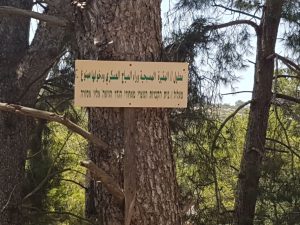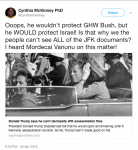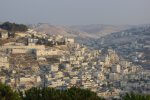Israel blocks Christians from visiting grave sites
Israel blocks Palestinian grandmother from visiting father’s grave in Christian cemetery. Israeli army expelled residents, demolished Galilee village in 1948; Adalah demands all displaced residents of Ma’alul be allowed to visit family graves, now surrounded by Israeli military base.
For years, Israel has been preventing Salwa Salem-Copty, a Christian Palestinian Arab citizen of Israel, from visiting the grave of her father killed by Israeli troops in his Galilee village in 1948, just a few months before she was born.
[CLICK HERE to read this press release on Adalah’s website]
Israeli forces occupied Ma’alul in July 1948, expelled its Palestinian residents, and destroyed the entire village with the exception of two churches and a mosque. Israel has since prevented the village’s displaced residents from returning. An Israeli military base was built around the village’s Christian cemetery and the displaced residents, whose loved ones are buried in the cemetery, have been barred by Israeli authorities from visiting family graves since 1948.

Adalah – The Legal Center for Arab Minority Rights in Israel has sent a letter to senior Israeli political and military officials demanding that Salem-Copty and other internally-displaced Christian Palestinian residents and their descendants be allowed to visit the graves of family members in Ma’alul.
Adalah sent the letter on 24 September 2017 to Israeli Interior Minister Aryeh Deri and the Israeli military’s head of Northern Command, Yoel Strick, on behalf of Salem-Copty.
Displaced residents from Ma’alul fear graves in the cemetery have been desecrated.
‘I dream about this grave’
Salem-Copty’s father was killed in April 1948 and buried in Ma’alul. She was born in Nazareth just a few months later and has been attempting to visit her father’s gravesite for years, but has been prevented on each occasion by Israeli authorities.
“It was very hard to live without a father. It’s a disaster I’ve been living with my entire life,” Salem-Copty said. “When I was five years old, my mother told me she dreamt about Dad. She dreamt they met in the village as he was going to fetch water. They talked and he asked about everyone in the family – except for me, because he didn’t know me. I wasn’t born yet when he was killed.”

Years later, Salem-Copty and other displaced residents began to visit Ma’alul during Easter and pray in the church.
“I knew that my father was born and married there. When I would visit the village, I would imagine where my father would have walked. It would stay with me all the time. I started to come to the military base and ask them to let me in. After Easter mass, I place flowers in the church and cry out for my father. I don’t want any child to feel what I feel.
“I dream about this grave. I’m begging. I want nothing else but to visit my father’s grave. I want to be buried next to my father.”
Adalah Attorney Muna Haddad wrote in the letter that:
“Preventing Ms. Salem-Copty and other displaced residents from maintaining the cemetery and from visiting the graves of relatives – including those of grandfathers and grandmothers, parents, uncles, aunts – constitutes a gross violation of the right to dignity of the deceased.”
Adalah demands Israeli authorities allow Salem-Copty and other former villagers expelled from Ma’alul to visit and maintain their family graves, and calls on the Interior Ministry and the Israeli military to maintain and protect the cemetery against the threat of vandalism and desecration.
For more information on Adalah, visit www.adalah.org


- Israelisnipers shooting and killing hospital workers in Gaza - December 11, 2023
- CAIR Condemns Israeli Executions of Wounded, Unarmed Palestinian in West Bank - December 11, 2023
- Arab and Muslim American voters face a “simple choice” between Biden’s inhumanity and Trump’s edgy politics - December 9, 2023























